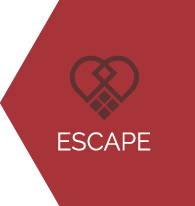One of the more challenging parts of working in a domestic violence is the regularity with which you hear the same kinds of stories. While our clients all come from different backgrounds and have different life stories, the details of their abuse are (to those of us who have worked in this field for awhile) depressingly similar. Among the most reliable tactics an abuser can use to keep victims feeling helpless is isolating them from their families and friends. Relationships are powerful, and isolating a woman can keep her from realizing her most intimate relationship is abusive.
I’ve been thinking a lot about the power of relationships lately. Hanging throughout the Eagles’ Nest Shelter we have a Lakota saying: “Mitakuye Oyasin .” It means “We Are All Related.” After sitting through a particularly difficult conversation with one of our clients, I was walking down the hallway and ran into one of my coworkers. We stopped for a moment and caught up with one another. Frustrated and angry, I pointed to one of the “Mitakuye Oyasin” posters and said “I think the only way we’re all related is in our ability to be terrible to one another.”
She listened quietly while I fumed for a few more minutes. “I’d never thought about it like that.” She responded when my anger had run its course.
“Really?”
“Really.” She paused. “I always thought of it more as we’re all related—defined, really—not by the terrible things that have happened to us, but by the ways respond to them. She shrugged. “It helps me, at least.”
She’s right, of course. Any number of those of us who work here for Women of Nations started working to end domestic violence because of a personal connection to it. We know women and children who were impacted by violent relationships. But instead of allowing those relationships to divide us from our community and instead of letting them define us, we’ve chosen to help other women and children escape violence. We see one another not as strangers, but as members of our own families.



